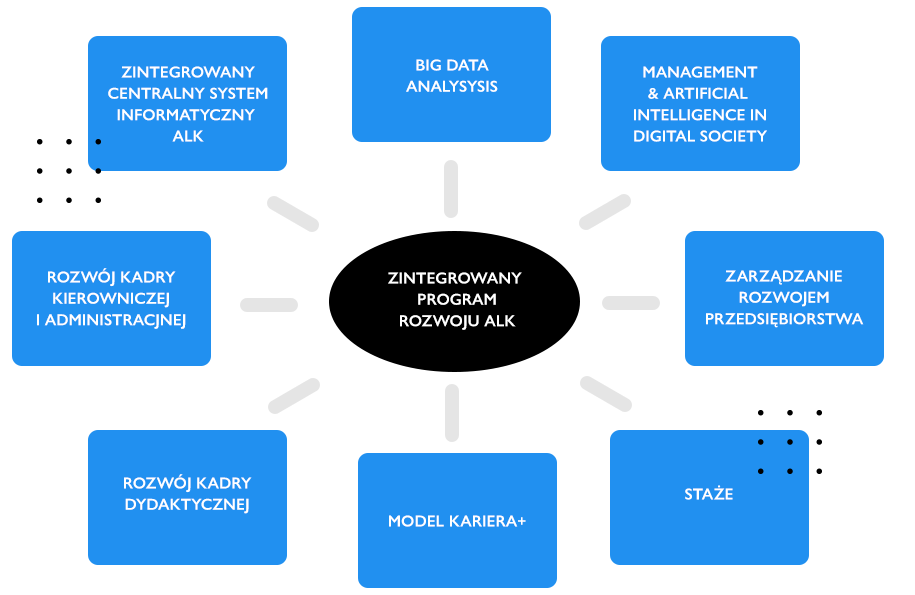ACADEMY 360 - an integrated system of quality improvement at KU
ACADEMY 360 - an integrated system of quality improvement at KU


Our project is aimed at KU students, academic teachers, and administrative staff - a total of 1196 people.

The main objective of the project is to improve the quality of education and management at Kozminski University in response to the needs of KU’s social-economic environment by:
- designing and delivering 3 new curricula;
- running internship programmes;
- designing and implementing a comprehensive model of supporting students in their first steps in the job market - KARIERA+;
- undertaking activities to improve the teaching skills of KU’s faculty;
- undertaking activities to improve the management skills of KU’s management and administrative staff;
- developing IT tools.
We have planned the following measures to be adopted as part of the Integrated KU Development Programme:
- launching new specialisations (majors): Big Data, Management and AI in Digital Society, Corporate Development Management;
- running internship programmes;
- implementation of the Kariera+ model;
- faculty development;
- development of management and administrative staff;
- implementation of the Integrated Central KU IT System.
Most important outcomes:
- 1081 (545W/536M) individuals will improve their competencies;
- 108 (43W/65M) KU faculty members will improve their teaching skills;
- 108 (73W/35M) KU staff members will improve their management skills;
- 30% of KU graduates will continue their education or get a job within 6 months of graduation;
- KU will implement changes in the scope of teaching process management - the Integrated KU Development Programme;
- KU will implement 6 modules as part of an Integrated Central KU IT System
- See the effects of our work
Modules implemented under the project
A real revolution in the labour market, which some higher education institutions have anticipated and designed new programmes to address it, is just around the corner. In a few years’ time, their graduates will be the most sought-after specialists in the sector of artificial intelligence, e-marketing, or big data. In 2016, the World Economic Forum published a special report, where it announced that 5 million jobs would be taken over by robots by 2020. The U.S. Bureau of Labor Statistics, on the other hand, predicts that by 2026, the largest increase in the number of jobs will take place in the health care sector (even by over 40%) and in the new ICT technologies sector. There will be 31% more software/application developers and 23% more market research analysts and marketing specialists than now. For comparison, the employment prospects for accountants and financial advisers are also high, but the expected increase in the number of jobs for these professions is only 10%.
The global labour market trends have a clear impact on the functioning of modern business schools.
"Higher education needs to be practice-oriented in the first place" – claimed the founder of Kozminski University, Professor Andrzej Koźmiński 25 years ago, when he established one of the first private higher education institutions in Poland. Today, its president, Professor Witold Bielecki, remains faithful to this commitment, boldly introducing innovations in education. The response to said demand is three new specialisations focusing on the development of skills and abilities required in the professions of the future.
MANAGEMENT AND ARTIFICIAL INTELLIGENCE IN DIGITAL SOCIETY
The specialisation is offered at the undergraduate level of Management, and taught in English. Its aim is to provide students with knowledge and skills in the area of high-tech and social media, and familiarise them with tools used in complex analyses of digitalisation processes. Thanks to the module focusing on the issue of artificial intelligence, students will also gain basic and advanced skills in the area of programming and machine learning. They will also learn how to analyse large volumes of data and solve problems related thereto. They will employ this knowledge and these skills in improving decision-making processes in economic and business activity.
It is a specialisation for individuals interested in high-tech, technological development of start-ups, considering working in institutional or corporate research departments, developing scientifically in the area of the specialisation, with a well-developed skill of analytical thinking.What makes the programme unique is its interdisciplinarity and a broad perspective on the contemporary technological revolution. Second – it gives students a lot of freedom in developing their interests, offering them courses letting them deepen their interests starting with the second semester already (basic and advanced options). Third – education covering the fundamentals of artificial intelligence (AI) has been gaining a growing interest as of late. Fourth – the programme offers a combination of programming classes with modules focusing on studying digital societies, taking advantage of big data and of the potential of social media. It’s the first programme integrating management, artificial intelligence, and issues related to the notion of digital society. It should be therefore attractive to start-up owners, future entrepreneurs, and researchers alike. It integrates managerial competence with hard skills from the areas of IT and AI, and takes the latest trends in the scope of technological development into account as well.
The amount of the tuition fee has been much reduced compared to the costs of specialisations taught in English as part of Management because it is co-financed from the resources of the European Social Fund. We have planned one intake for the academic year 2018/2019.
Professor Dariusz Jemielniak e-mail: darekj@kozminski.edu.pl
KU Professor, Aleksandra Przegalińska-Skierkowska, PhD e-mail: aprzegalinska@kozminski.edu.pl
Agata Stasik, PhD e-mail: astasik@kozminski.edu.pl
BIG DATA ANALYSIS
The specialisation is offered at the graduate level of Finance and Accounting, and taught in English. Its aim is to provide students with knowledge and skills in the area of identification, acquisition, storage, and analysis of huge volumes of data, and of solving problems related thereto by providing modern IT methods and tools used in contemporary analytics. Students will gain skills that will let them carry out analyses and take advantage of results thereof in decision-making processes in economic and business activity.
It is a specialisation aimed at individuals who have completed their tertiary education and have basic knowledge in the area of finance, interested in the broadly defined financial markets and data analytics, with a well-developed skill of analytical thinking, considering working as researchers in economic corporate departments or institutions.
There are at least five elements that will make the programme unique. First, it is practice-oriented while being combined with research. From the first semester onwards, students will run projects together with partner institutions (in every semester). Second, the master’s thesis is an implementation project, which means that throughout the two years of studies, students are engaged in a big project supervised by a KU representative + an institution/supervisor. Third, the programme gives students a lot of freedom in developing their interests, offering them elective courses starting in the second semester already. Fourth, most of the taught courses are classes taught in the form of workshops. This means that students learn working in development environments from the very beginning. Moreover, they become familiar with software used most often by enterprises. Finally, the programme gives students an opportunity to spend their last semester at the institution supervising their master’s theses. The essences of the programme is also the fact that the collaboration with partners will involve not only solving problems in practical terms but also considering the solved problems in a broader context – they will be linked to research aspects by e.g. developing students’ skills of analysing, interpreting, modelling, and forecasting.
The amount of the tuition fee has been much reduced compared to the costs of specialisations taught in English as part of Finance and Accounting because it is co-financed from the resources of the European Social Fund.
We have planned two intakes, for the academic year 2018/2019 and 2019/2020.
Ku Professor, Aneta Gontarczyk-Hryckiewicz, PhD e-mail: ahryckiewicz@kozminski.edu.pl
CORPORATE DEVELOPMENT MANAGEMENT
The specialisation is offered at the graduate level of Management, and taught in Polish. Its aim is to prepare its graduates to coordinating the process of solving management problems in all crucial areas, in both a strategic and an operational perspective of an enterprise. There is a need for teaching not only managers but also students who already manage enterprises or get ready during their studies to assume such a role soon. It is more and more common to see current business owners and managers handing over the helm to members of their families or hired managers from trusted environments.
Corporate Development Management is aimed at persons who have completed their tertiary education, have basic knowledge in the area of corporate management, managing enterprises and/or preparing to assume key positions in enterprises (succession).
The following elements make this specialisation unique. Creation of a one-of-a-kind specialisation, available in the education market – considering its content – virtually only in the form of MBA studies. The studies focus from the very beginning at solving problems related not only to management but also to ownership. All courses are run in the same sequence, which ‘forces’ a practical approach. Lastly – the outline for the whole programme will be a system known from methodical problem solving: analytical modules; implementation modules based on conclusions drawn from analytical modules – designing holistic and specific solutions; implementation modules – advanced extension of implementation modules to include elements concerning selected issues.
The amount of the tuition fee has been much reduced compared to the costs of specializations taught in Polish as part of Finance and Accounting because it is co-financed from the resources of the European Social Fund.
We have planned two intakes, for the academic year 2018/2019 and 2019/2020.
Jan Dąbrowski, PhD e-mail: jgd@kozminski.edu.pl
The main objective of this module is to improve the competencies expected by employers among students of Management, Finance and Accounting, and Law. This goal will be achieved by enabling students to take part in high-quality programmes, covering 2 months and 240 hours of internship tasks on average.
The scope of the internship will be jointly arranged by a KU employee, the intern, and the employer, which will guarantee the consistency of the internship programme with the learning outcomes and the expectations of the participants. An intern supervisor representing the employer will make sure that the internship goes as expected. All this will improve participants’ competencies demanded by the labour market and the economy.
The internship, in turn, will help those who serve it boost their confidence and their motivation to act, create an opportunity for them to develop specific competencies and see how their skill sets meet the demands of the job market. At the end, the conducted competency test will make it possible to determine the extent of improvement and prepare an individual report with recommendations for further professional development of those taking part in the project.
The above mentioned activities will be carried out in the academic years 2018/2019, 2019/2020, and 2020/2021.
Aleksandra Mioduszewska-Pucek phone: +48 22 519 23 20 or 4320 e-mail: apm@kozminski.edu.pl
Marek Obszański phone: +48 22 519 21 57 or 4157 e-mail: obszanski@kozminski.edu.pl
One of the key tasks of the university is to make students ready to enter the job market consciously and with good prospects of employment. This goal can be achieved through activities involving professional career counselling and coaching. Our Career Development and Alumni Relations Office (CDARO) offers our students and graduates career counselling sessions in both group and individual formats, based on the latest trends and working methods used worldwide. At the same time, our aim is to create a diversified and attractive offer in this area. One which will support students in building their employability and professional awareness from the first year of their studies. The idea is to make career counselling one of the key elements of a larger process through which students can take advantage of by contacting CDARO. We called this comprehensive solution to support students the KARIERA+ model.
Based on watching how well-functioning career offices operate, it appears that students expect extensive support in the area of starting the pursuit of their career in the job market, with particular emphasis on employer branding activities. Counselling alone, without the Office’s efforts to offer various places and forms of recruitment, makes CDARO’s activities much less effective. In line with direction of development, career counselling becomes an element of a bigger process which students can take advantage of when contacting CDARO, which is materialised in the form of the KARIERA+ model. Its main idea is to help students of the last four semesters of full-time studies to make crucial decisions related to their further professional and educational paths.
We have planned to offer support to over 700 people by giving them an opportunity to participate in a comprehensive process consisting of individual consultation sessions and group workshops with career advisers. The KARIERA+ model is in line with the current trends in modern career counselling. It involves utilising e.g. team coaching, psychometric tests, and foreign business models.
Łukasz Olszta phone: +48 22 519 23 48 or. 43 48 e-mail: lolszta@kozminski.edu.pl
In order to continuously improve the teaching skills of our faculty, Kozminski University offers a wide range of training courses for a large group of academic teachers. The aim of the planned training courses is to improve our faculty members’ teaching, IT, and presentation skills, as well as help them become better in information management and be better-prepared to teach classes in a foreign language. The first training courses will start in 2018 and run until 2021. Our faculty members will be taking part in high-quality training both in Poland and abroad. Benefits for academic teachers:
- becoming familiar with innovative teaching methods used at higher education institutions abroad;
- ability to prepare oneself to teaching and teach classes with the use of research projects conducted by students;
- acquisition/improvement of skills in the area of making use of online tools in planning and conducting teaching activities;
- acquiring knowledge and skills in making use of databases in the teaching process;
- giving presentations and public speeches effectively;
- acquisition of knowledge related to so-called critical thinking and the ability to use this knowledge in practice in the teaching process;
- broadening one’s specialist vocabulary necessary to teach courses in a foreign language and learning how to use it in conducting classes.
The idea is for the participants to take part in 3 training courses on average – their choice will be the result of individual needs analyses, which will take into account the needs of the employee themselves and their superior’s indications, including the plans resulting from the employee’s performance assessment. One training course will cover 16 hours on average and will take the form of a workshop.
As part of the development of our faculty members, we have arranged for 4-day trips abroad for 20 people, including 16 hours of training and participant observations, job shadowing, learning by doing, participation in classes. Each participant of the training abroad will:
- receive a grant to cover the costs of living and accommodation for the duration of their stay abroad;
- be reimbursed for the cost of the flight to the place of training.
The competencies acquired by the faculty will be used in the course of the classes conducted with students for at least 1 semester starting after the training. The faculty members will be supported by a group of mentors in applying the training results in the teaching process. Moreover, there will be a competition for micro-innovations in teaching.
Beata Chmura phone: +48 22 519 22 19 / 519 21 25 or 4219 e-mail: bchmura@kozminski.edu.pl
Agnieszka Sławska phone: +48 22 519 21 25 lub wew. 4125 e-mail: aslawska@kozminski.edu.pl
The plan of professional development aimed at KU’s management and administrative staff is a comprehensive system of development initiatives, connected with an individual professional development path of employees and related to the mission and the development strategy of the university as a whole.
The need to improve the competencies of employees is also in line with the area of values worked out and adopted in 2016, especially: professionalism – including effective communication, mutual respect, and proactivity.
KU’s population of employees is highly age-diversified and internationalised, which calls for continuous improvement of competencies – including language skills – among KU’s management and administrative staff, who are ‘on the frontline’, dealing with customers of different nationalities, cultural backgrounds, and ages.
The offered training courses support the development of employees’ knowledge and competencies, which are essential to their jobs and defined in the KU competency model, grouped into 5 thematic areas:
- self-management skills
- IT (tool) skills
- communication skills
- managerial skills
- language skills.
A competition for orgranisational micro-innovations will be organised for the participants. These initiatives will enable systemic change, supporting the improvement of the quality of university management at KU, and will contribute to the sustainability of results. The idea is for the participants to take part in 3 training courses on average – their choice will be the result of individual training analyses.
The subject matter and the scope of training courses closely correspond to the set development goals of employees, defined within the framework of the system of periodic performance assessment, operational goals of the unit, and the position held. In particular, they aim at increasing the level of knowledge, competencies, and skills of employees essential to their positions, in accordance with the latest trends on the labour market, new technologies, regulations, etc.
All development activities carried out under the project will be subject to an assessment of effectiveness and to an evaluation of outcomes. Therefore, at the beginning, an analysis of employees’ competencies will be carried out, which will make it possible to define the relevant areas of support for particular employees. A similar analysis will be carried out at the end of the project, which will verify the effectiveness of the support provided.
The analysis of the effectiveness of the conducted training courses, and the following determination of the dynamics of changes in the area of competencies and of the increase in the level of knowledge of employees will determine the success of the implemented project.
Barbara Kluczek phone: +48 22 519 24 83 or 4483 e-mail: bkluczek@kozminski.edu.pl
The aim of the Integrated Central Information Technology System (ICITS) is to automate the processes related to the quality of education at Kozminski University – from the stage of attracting applicants for admission to KU through the duration of their studies at KU ending with them becoming KU graduates, and making use of this relationship to improve the quality of education offered to current students.
In addition, thanks to the automation of said processes, the solution will relieve administrative and academic staff from repetitive tasks, which in turn will let them spend more time working with students.
We’re planning to implement the following modules within ICITS:
- Central IT System
- CRM
- Retention and Engagement System
- Client Account
- Online Admission
- Alumni Platform.
Maciej Madziński phone: +48 22 519 22 92 or 4292 e-mail: maciej.madzinski@kozminski.edu.pl
Realizacja zadania jest zasadna z punktu widzenia celu Projektu i planowanych wskaźników. Odpowiada na aktualne potrzeby, bariery i oczekiwania potencjalnych uczestników Projektu w zakresie wsparcia. Potrzebę realizacji potwierdzają zarówno analizy wew. ALK, jak i wyniki badań ogólnopolskich, w tym dot. zapotrzebowania pracodawców i rynku na pracowników z przedmiotowymi kompetencjami i doświadczeniem oraz cele strategiczne ALK.
Zaplanowaliśmy realizację modułu kompetencyjnego adresowanego do studentów prawno-biznesowej specjalności na Administracji.
Każdy proponowany warsztat będzie wzmacniał min. 2 kompetencje spośród poniżej wymienionych: zawodowe, językowe, komunikacyjne (w tym umiejętności pracy w grupie i interpersonalne), w zakresie przedsiębiorczości, informatyczne, analityczne, a potrzeba ich realizacji wynika ze zdefiniowanych luk kompetencyjnych studentów oraz kompetencji oczekiwanych przez pracodawców.
W realizację modułu zaangażujemy także pracodawców.
Proponowane zakresy działań:
1. Umowy handlowe w obrocie gospodarczym - studia przypadków. Poszerzenie kompetencji studentów z zakresu stosowania prawa w obszarze ochrony interesów przedsiębiorcy. Praktyczne aspekty z zakresu prawnych form zabezpieczenia wykonania umowy, wprowadzania zmian i utrzymywania umowy w mocy, zakończenie realizacji umowy.
2. Transformacje w sferze prawnych form prowadzenia działalności gospodarczej studia przypadków. Poszerzenie kompetencji studentów z zakresu przekształceń dokonywanych na gruncie wybranych aspektów łączenia, podziału i przekształceń w wybranych spółkach prawa handlowego.
3. Prosty język w administracji publicznej i biznesie - wprowadzenie do założeń i zasad prostego języka. Warsztaty redakcyjne, w tym: praca z tekstem na wszystkich poziomach (treści, struktury, frazowania i relacji ) - analiza pism, redagowanie tekstów w grupach, przygotowanie wzorów pism zgodnie z zasadami prostego języka. Upraszczanie przykładowych pism, umów, instrukcji. Dobre praktyki i baza wiedzy.
4. Zarządzanie pracą wykonywaną zdalnie. Wyposażenie studentów w aktualną wiedzę i umiejętności z zakresu sposobów eliminowania barier i ograniczeń w komunikacji realizowanej w trybie zdalnym, a także zasady skutecznego delegowania, monitorowania i egzekwowania realizacji zadań na odległość.
Planujemy, że warsztaty będą średnio 4-godzinne. Weryfikacja nabytych kompetencji obejmie 4 etapy.
Maria Tomaszewska e-mail: mariat@kozminski.edu.pl

